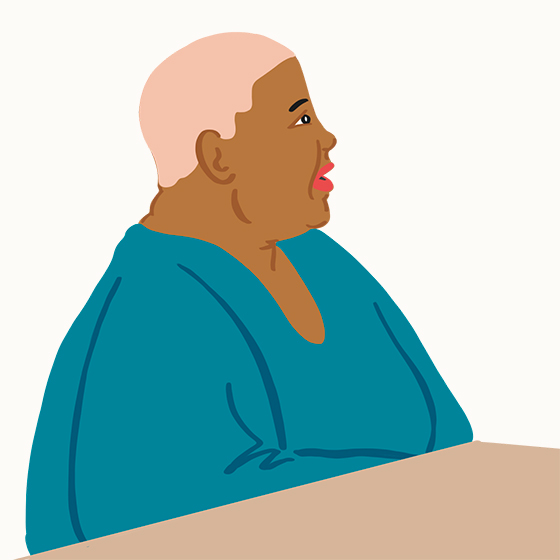Supporting young adults 19+
When your child becomes a young adult at 19, they likely still need your support and encouragement as they navigate the challenges of early adulthood.
The journey you take while supporting your young adult child to live in their authentic gender is unique for each family. Providing support has many aspects, many of which are summarized below.
You and your child may have many questions about gender identity A person's deeply held, internal sense of themself as male, female, a blend of both or neither. (Source: GenderSpectrum.org) and transition. Our Explore and Transition section provides more information on these topics.
Affirmation & social transition
Social transition and affirmation The ways a person can be supported in expressing their self-identified gender. This may involve supporting social transition steps or changes in gender expression. describe non-medical parts of a person’s gender journey. This journey is different for every person. Social transition is an aspect of transition that can be explored at any age.
There are several social transition options that a young adult may want to try. These include:
- Changing gender expression How a person outwardly communicates their gender, including name and pronoun choice, style of dress, and voice modulation. (Source: QMUNITY) — Such as their clothing or hairstyle.
- Changing their pronouns and name — They may want to use or try out a different name or different pronouns.
- Changing speech — Changes to speech may present a more masculine, feminine or androgynous gender expression.
- Binding, packing, tucking or padding — Young adults may use these non-surgical options to alter their gender expression.
- Hair removal from the face or body — The presence or absence of hair can be a significant part of gender expression. There are short and long-term options to address body and facial hair.
- ID change — Young adults may want to update the name, gender markers or both on their identity documents.
Affirming young people in their genders
Steps you can take to affirm your child’s gender and support them during social transition in early adulthood may include:
- Asking what kind of support would be helpful
- Using correct names and pronouns
- Helping others practice the new name and pronouns
- Going shopping together for new clothes
- Supporting them to get a new haircut
- Practicing with makeup
- Helping your child access binders, bras and other gender-affirming products, if needed
- Advocating for inclusion in school and community spaces
- Supporting them in navigating their workplace
- Supporting them in navigating the health care system
If your child has expressed a need to socially transition, here are some questions to help them consider:
- What would need to change so they could live fully in their authentic gender?
- Are there any safety concerns that need to be addressed?
- Who else do you need on board to support your family (for example, extended family, friends or a counsellor)?
Some families proceed fairly smoothly through social affirmation The ways a person can be supported in expressing their self-identified gender. This may involve supporting social transition steps or changes in gender expression. or transition without help from health care professionals. Other families seek out counselling or peer support for their child, themselves or both.
Peer support
Family members and friends can be a great source of support. However, they may not have lived experience as a trans, Two-Spirit A term used within some Indigenous communities to reflect complex Indigenous understandings of gender and sexuality and the long history of sexual and gender diversity in Indigenous cultures. Two-Spirit encompasses sexual, gender, cultural and spiritual identity. It may refer to cross-gender, multi-gender or non-binary gender roles, non-heterosexual identities, and a range of cultural identities, roles and practices embodied by Two-Spirit peoples. Some people also use "2-Spirit" or "2S." (Source: Battered Women’s Support Services) or non-binary Umbrella term referring to people whose gender does not fall within the binary gender system of woman/girl or man/boy. Some individuals identify as non-binary while others may use terms such as gender non-conforming, genderqueer, or agender. Non-binary people may or may not conform to societal expectations for their gender expression and gender role, and they may or may not seek gender-affirming medical or surgical care. person or lived experience as the parent of a trans, Two-Spirit or non-binary person.
Sometimes it can help to connect with others who have walked a similar path. Shared experiences can give you insights and better understanding. Many parents and caregivers benefit from peer support.
Check out our Peer Support Directory for information about groups in your area.
CampOUT!
CampOUT! is a social justice summer camp for queer A reclaimed term for non-heterosexual or non-cisgender people. "Queer" provides convenient shorthand for "LGBT2Q+", and is also used by some people to describe their personal identities. , trans, gender-diverse Two-Spirit and allied youth and young adults ages 14–21 from British Columbia and the Yukon. Events and camps like CampOUT! may be an opportunity for peer support and connection for your child.
The event takes place every July near Vancouver. Leadership and camper applications begin in February.
Professional support
Health and wellness support is important, and the needs of each individual vary in terms of what kind of resources are helpful for them.
Mental health support
We all experience ups and downs, and our own strength, family and friends are often enough to get us through. However, significant distress may not resolve on its own, and it may be necessary to get professional help to keep your child safe. If your child is very anxious or depressed, harming themselves or considering suicide, please help them access professional mental health support.
Your child may also want to connect with a counsellor for reasons unrelated to distress. For example, counselling may help if your child wants to better understand, explore and express their gender.
If your adult child wants to see a counsellor, you can help them find a provider who is a good fit for them. Counsellors assist with issues such as:
- Working through their gender exploration
- Navigating peer relationships
- Deciding about possible medical interventions
- Dealing with social stigma
Health care professionals can also assist by providing documentation related to support plans at school and in the community.
Many professionals provide psychosocial support, including counsellors, social workers, psychologists and psychiatrists.
Mental health & the family
Professional support may also be helpful if you or other family members find it challenging to cope.
Siblings may need support dealing with changes in the family, especially if they feel that their trans sibling is the focus of everyone's attention.
Check out the section on Support for You to learn which resources are available.
Medical options
If your child feels distressed about their body not aligning with their gender identity A person's deeply held, internal sense of themself as male, female, a blend of both or neither. (Source: GenderSpectrum.org) , there are numerous gender-affirming medical care options they can consider.
Readiness assessment
It is a big decision to start hormone therapy or access other medical care related to gender. Before accessing gender-affirming care Processes through which a health care system cares for and supports an individual while recognizing and acknowledging their gender and expression. , care planning Process that a person, their health care providers, family and other supporters undertake in planning to reach their gender-affirming care goals. takes place (including a readiness assessment An evaluation conducted by a health care professional to determine if a patient is ready to begin hormone therapy or have gender-affirming surgery. ). What this looks like for your child will depend on your child and family’s care needs. As these processes can take time, you may want to get to know the steps involved in accessing gender-affirming care.
For more information about readiness assessments and gender-affirming care, visit our How to Start Hormone Therapy section.
Hormone therapy
Some people access hormone therapy to help align their body with their gender. Hormone therapy allows people to develop secondary sex characteristics Physical traits that develop after sexual maturity (puberty), such as facial hair growth, deepening of the voice or breast development. that are in line with their gender identity.
For more information, see our Hormone Therapy page.
Gender-affirming surgeries
For some people, gender-affirming surgeries are important for living in their authentic gender. Bringing one's body into alignment with the true gender self may be necessary for reducing distress.
Visit our Surgery pages to learn more about gender-affirming procedures.
Finding appropriate care
Not all care providers have training in gender-affirming care. We recommend seeking out care providers who have experience working with trans, Two-Spirit A term used within some Indigenous communities to reflect complex Indigenous understandings of gender and sexuality and the long history of sexual and gender diversity in Indigenous cultures. Two-Spirit encompasses sexual, gender, cultural and spiritual identity. It may refer to cross-gender, multi-gender or non-binary gender roles, non-heterosexual identities, and a range of cultural identities, roles and practices embodied by Two-Spirit peoples. Some people also use "2-Spirit" or "2S." (Source: Battered Women’s Support Services) and non-binary Umbrella term referring to people whose gender does not fall within the binary gender system of woman/girl or man/boy. Some individuals identify as non-binary while others may use terms such as gender non-conforming, genderqueer, or agender. Non-binary people may or may not conform to societal expectations for their gender expression and gender role, and they may or may not seek gender-affirming medical or surgical care. youth and young adults or providers willing to learn how to provide the best possible care.
To find professional support resources in your community, visit the How to Get Care section of our website.
Contact our team of experienced health navigators for information about gender-affirming care in B.C.
Community Voices

Once hormones and surgery became part of the conversation, I felt a bit of fear as a parent. It’s not my decision because it’s their body. But I think a lot of that fear for me came from a lack of understanding. As a parent you wonder if they know what they’re doing, but you also have to trust that they’re choosing to do what’s best for them.
—H, on the topic of her adult child’s transition

The first time my dad introduced me as his son in a public setting… that was the moment I felt included in my family after I came out. It was one thing for me to navigate acceptance within the family, but outside the family I wondered if my parents would ever publicly acknowledge me. Having my dad do that, and do this so proudly and openly, meant more to me than I think he’ll ever know.

